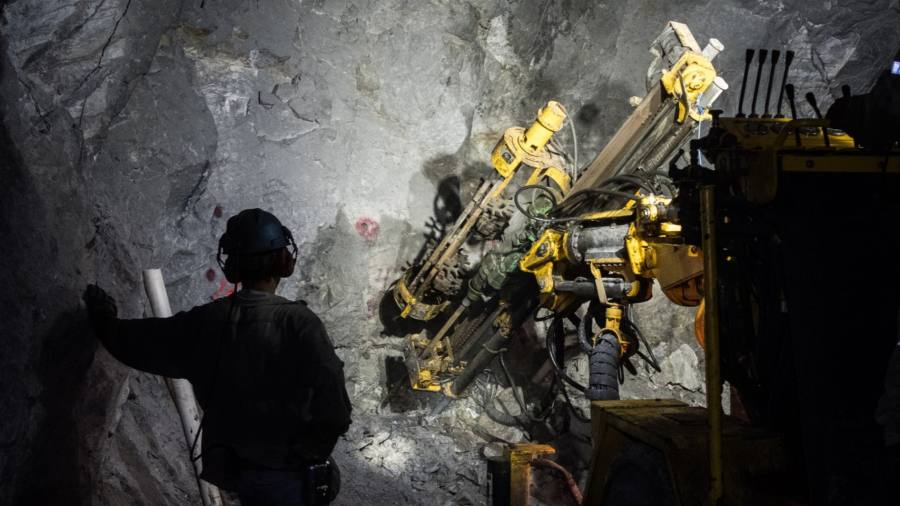Mining companies are rethinking investments in Mexico, the world’s biggest silver producer, after the government last month pushed through sweeping regulatory changes.
The country’s mining body Camimex has warned the legal reforms could jeopardise $9bn of investment in the next two years while stymying the development of Mexico’s vast resources for clean energy technology.
The mining code changes, which include making it more challenging for companies to obtain mineral concessions, threaten to trigger a wave of litigation by Canadian miners invested in the country.
It is also causing diplomatic tensions with its free trade partner Canada, where nearly 70 per cent of foreign-owned mining companies operating in Mexico are based.
“This law is clearly going to have an impact in the investment decisions of all members of the industry, in the short, medium and long term,” said Jorge Ganoza, chief executive of Canada’s Fortuna Silver Mines, which has since 2011 spent more than $350mn on a silver and gold mine operating in southern Mexico.
“We work in remote areas, where it’s very difficult for the state to come and create quality employment in places where there aren’t other opportunities. These laws impact investment and they also impact the people that the government wants to help the most.”
Mexico is the world’s largest producer of silver — an increasingly important metal for its use in solar panels, electric cars and 5G telecoms networks — and a significant supplier of copper and zinc, demand for which is set to surge with the shift to renewable energy. The sector employs 2.5mn workers directly and indirectly.
Since taking office in 2018, Mexican president Andrés Manuel López Obrador has embarked on a leftwing populist agenda that includes reasserting state control over natural resources and increasingly arbitrary government interventions in the economy, many of which have been challenged in the courts.
López Obrador has halted awarding new mining concessions and castigated mining magnates for avoiding tax payments, causing environmental damage and putting pressure on water supplies because of excessive use.
The nationalisation of Mexico’s lithium reserves last year has hindered projects including the Sonora mine that Chinese producer Ganfeng Lithium bought for £285mn in 2021 and was expected to be in production by 2023.
Under the new mining regulations, which were rushed through Congress during sessions attended only by the ruling party and its allies, explorers will only be able to obtain concessions following a public bidding process conducted by the Mexican economy ministry, a shift from previous policy that granted such rights to the first qualified applicant seeking to develop an area.
“The majority in Congress engaged in an unprecedented rubber-stamping exercise by sanctioning a game-changing framework for mining operations and investment,” said Armando Ortega, chair of the mining committee of the Canadian Chamber of Commerce in Mexico. “This framework includes reserving mining exploration for the Mexican state.”
Other modifications include shortened concession timeframes with renewals shrinking from 50 to 25 years, tighter restrictions on water use in projects and limiting the rights to only exploit certain minerals rather than any discovered in the area.
Canada’s trade minister, local ambassador and mining executives have also expressed concerns to Mexico’s economy minister that giving preferential treatment to state-owned entities risks breaching its obligations under the free trade US-Mexico-Canada Agreement as well as the Comprehensive and Progressive Agreement for Trans-Pacific Partnership.
Under the new legislation, all mining exploration activities will be conducted by the Mexican Geological Service, an underfunded state-run agency that could cripple exploration.
Dan Dickson, chief executive of Endeavour Silver, a Canadian company with two silver mines in production in Mexico, said the changes to concession terms would affect exploration companies’ ability to secure finance. Without exploration companies doing the research and development work for the mining sector, “there will be a gap in what we are mining”, he said.
“We deplete our resources and need to make new discoveries to replace that supply. It will limit companies coming behind the operators to bring that additional supply on.”
Tamino Minerals, a small Canadian explorer, last month announced it was abandoning Mexico due to the country’s “political instability”. It will now invest in Peru, despite last year’s protests against mining in the country.
López Obrador has also ratcheted up tensions in recent weeks with Mexico’s largest mining company Grupo Mexico by sending in troops to seize a stretch of railway that his government wants to use for a priority government transport project. Grupo Mexico declined to comment.
Riyaz Dattu, a Canadian lawyer at ArentFox, expects the mining chamber to lodge a legal challenge against the Mexican state but said that individual mining companies are reluctant to bring cases forward because of fear of asset seizures by López Obrador.
“You might win a battle but lose the war,” he said, adding that “it has been very apparent in the last two years that companies are looking to jurisdictions other than Mexico and investing elsewhere”.
The mining code changes come as Latin American governments struggle to capitalise on the opportunity created by soaring global demand for critical minerals vital to strategic industries.
In Chile, President Gabriel Boric’s government’s policy for greater state control over lithium announced last month sent a chill through the investment community.
“Latin and Central America are more difficult at the moment — they’re important for copper but the governments have made it difficult,” said Jon Stanton, chief executive of the Weir Group, a large British mining equipment supplier.
In contrast, investment and orders have been booming in Indonesia, Australia and the US, he added.
The Mexican government argued the mining legislation changes respect existing trade agreements and “guarantee the practice of sustainable mining”.
Mexico now has a 180-day period to iron out the final regulation. The Canadian Chamber of Commerce’s Ortega urged the government to address business concerns.
“We’re always looking to expand our business in Mexico,” Fortuna’s Ganoza added. “But in light of this law, we’re going to re-evaluate everything.”
Read the full article here




